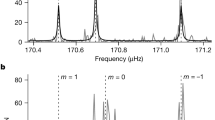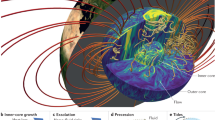Abstract
THERE is considerable physical evidence that the earth possesses a metallic core1. Jeffreys2 has estimated the viscosity of the core and finds it as low as 1010 C.G.S. units. If this value is correct, an intense thermal convection must be maintained in the core by the heat development of radioactive impurities, even if the amount of the latter is exceedingly small compared to their concentration in the earth's crust.
This is a preview of subscription content, access via your institution
Access options
Subscribe to this journal
Receive 51 print issues and online access
$199.00 per year
only $3.90 per issue
Buy this article
- Purchase on Springer Link
- Instant access to full article PDF
Prices may be subject to local taxes which are calculated during checkout
Similar content being viewed by others
References
Jeffreys, H., "The Earth" (2nd ed., 1927, ch. vii).
Jeffreys, Mon. Not. Roy. Astro. Soc., Geophys. Suppl., 1, 371, 416 (1926).
Bridgman, P. W., "The Physics of High Pressures" (London, 1931, ch. viii).
Author information
Authors and Affiliations
Rights and permissions
About this article
Cite this article
ELSASSER, W. Origin of the Earth's Magnetic Field. Nature 143, 374–375 (1939). https://doi.org/10.1038/143374b0
Issue Date:
DOI: https://doi.org/10.1038/143374b0
Comments
By submitting a comment you agree to abide by our Terms and Community Guidelines. If you find something abusive or that does not comply with our terms or guidelines please flag it as inappropriate.



